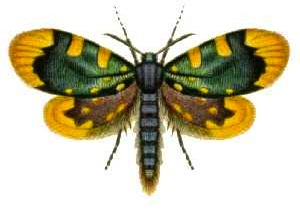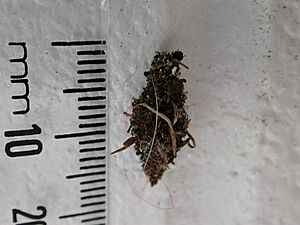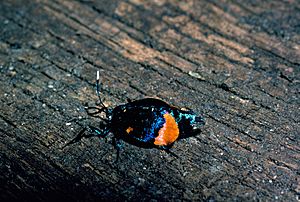Cebysa leucotelus facts for kids
Quick facts for kids Cebysa leucotelus |
|
|---|---|
 |
|
| Scientific classification | |
| Kingdom: | |
| Phylum: | |
| Class: | |
| Order: | |
| Family: |
Psychidae
|
| Genus: |
Cebysa
|
| Species: |
C. leucotelus
|
| Binomial name | |
| Cebysa leucotelus (Walker, 1854)
|
|
| Synonyms | |
|
|
The Australian bagmoth (Cebysa leucotelus), also known as the lichen bag moth, is a unique type of moth. It belongs to the Psychidae family, which is famous for the special protective cases their young build. You can find this moth in New Zealand and the southern half of Australia, including Tasmania, Victoria, and Western Australia.
Contents
About the Australian Bagmoth
What is a Bagmoth?
Like other moths in the Psychidae family, the young moths, called larvae, create a special protective bag. This bag acts like a tiny home or shield. The larvae use materials from their surroundings to build these cases.
These young moths are not picky eaters. They mostly feed on lichen and algae. Lichen is a mix of fungi and algae that grows on rocks and trees. Algae are simple plant-like organisms.
Male and Female Moths
Adult Australian bagmoths have very different looks and abilities depending on if they are male or female.
The Female Moth
The adult female moth has black wings with bright yellow tips and patches. However, her wings do not grow properly. This means she cannot fly at all. Because of her unusual appearance, people sometimes mistake female bagmoths for small beetles or even wasps.
The Male Moth
The male moth has a similar pattern and colors to the female. His wings are more brown and cream, and they do not have a shiny, iridescent look. Unlike the female, the male's wings are fully developed. This allows adult male moths to fly normally.
Neither the male nor the female adult moths ever eat. They live only for a short time, just long enough to mate and lay eggs.
Where Do They Live?
The Australian bagmoth is native to Australia. However, it has also spread to other places. Lichen bag moths arrived in New Zealand from Australia in 1981. Since then, they have been slowly spreading across New Zealand.
 | Jackie Robinson |
 | Jack Johnson |
 | Althea Gibson |
 | Arthur Ashe |
 | Muhammad Ali |



